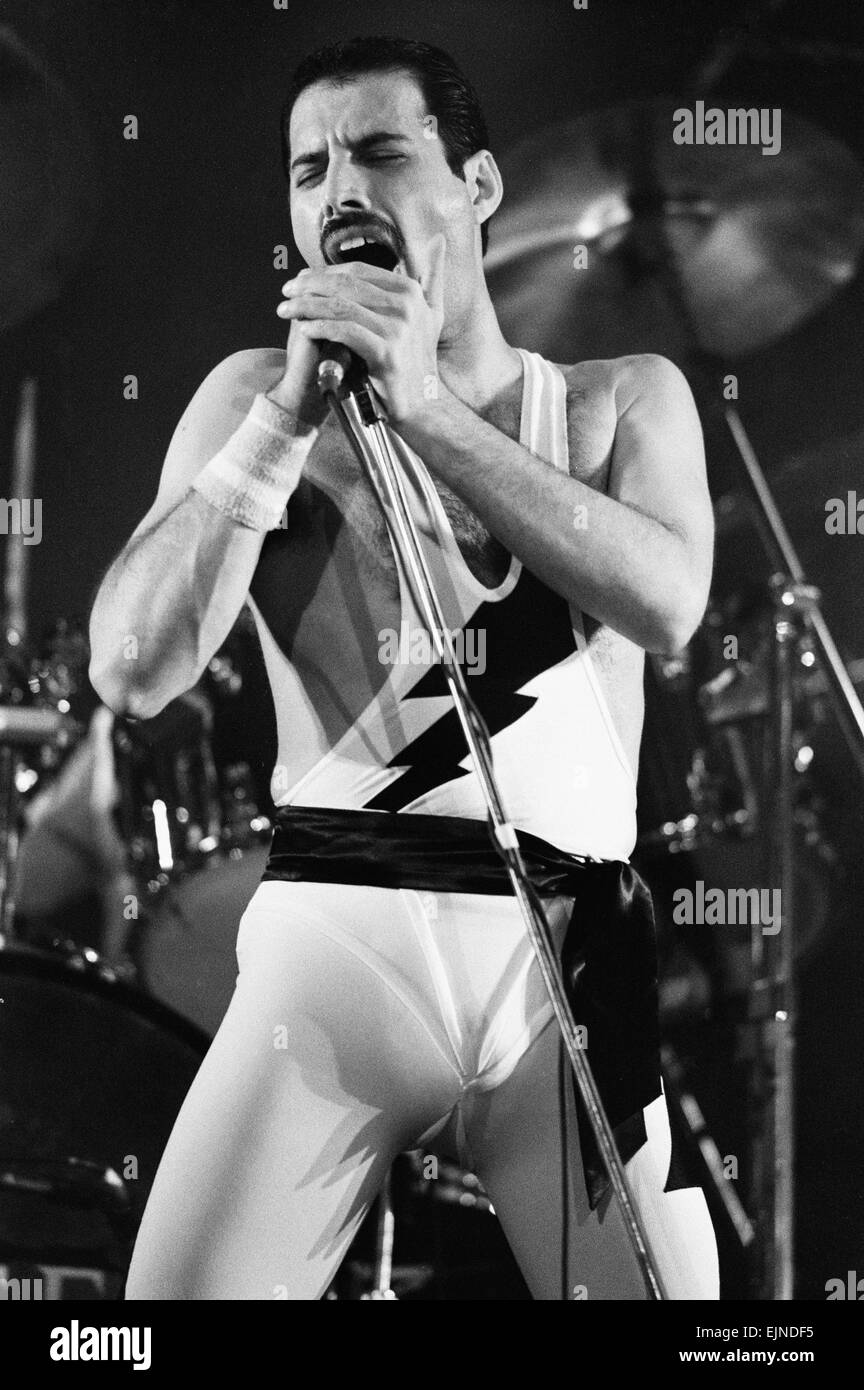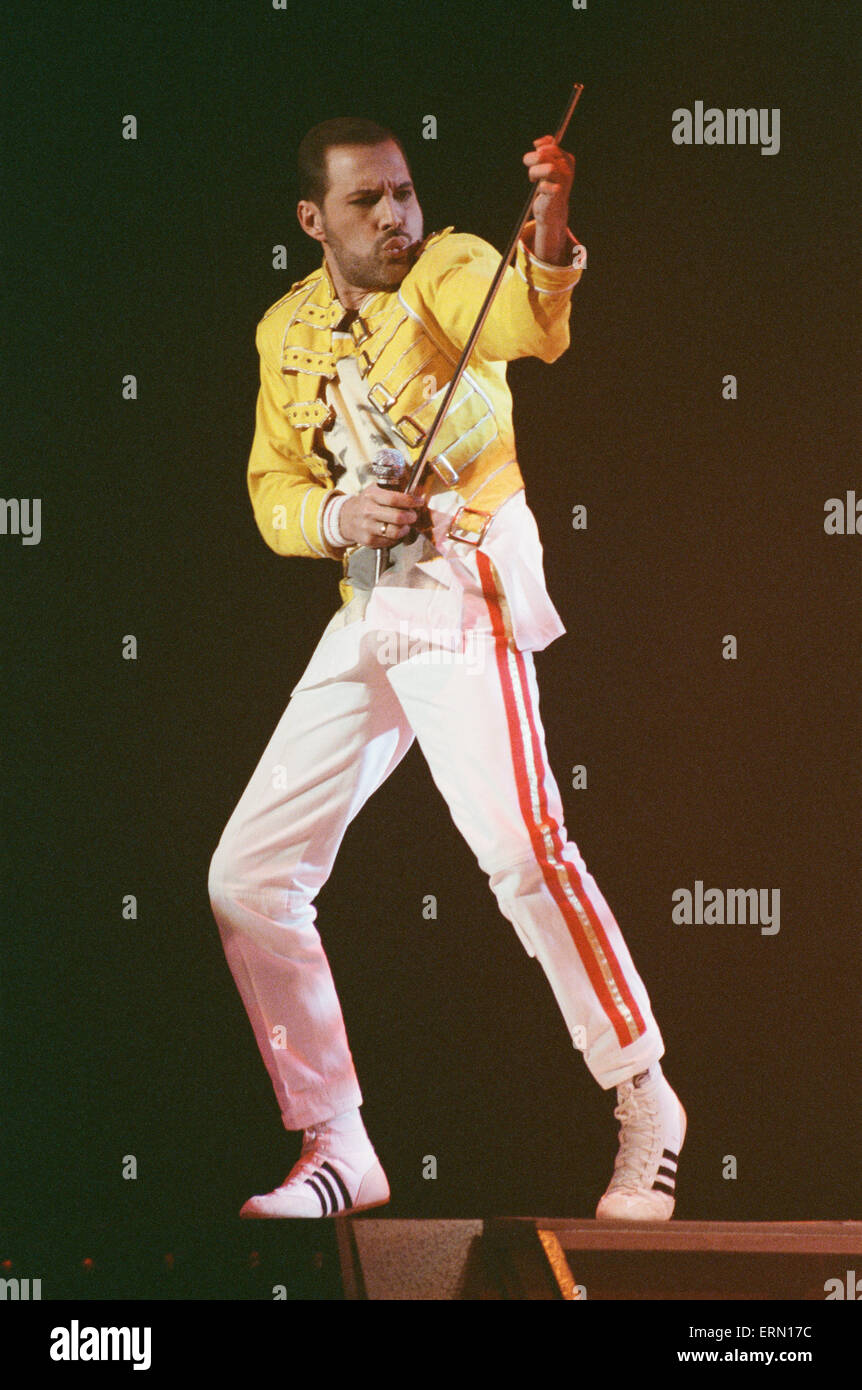Lead Singer Of The Group Queen: The Voice That Defined An Era
When we talk about the lead singer of the group Queen, one name immediately pops into mind—Freddie Mercury. His voice was like no other, and his charisma on stage turned every concert into a spectacle. Freddie wasn’t just a singer; he was a legend, a cultural icon, and a force of nature. So, let’s dive deep into the life, career, and legacy of the man who became synonymous with the band Queen.
There’s something magical about Freddie Mercury’s story. From humble beginnings to becoming one of the most celebrated frontmen in rock history, his journey is as inspiring as it is legendary. This guy didn’t just sing songs—he created anthems that transcended generations. Whether you’re a die-hard fan or someone who’s just discovering Queen’s music, understanding Freddie’s role as the lead singer will give you a whole new appreciation for the band.
But this isn’t just about Freddie. It’s also about the band Queen, their sound, their impact, and how they changed the music industry forever. And at the heart of it all was Freddie Mercury, the man who gave the band its voice, its soul, and its unforgettable performances. So, buckle up because we’re about to take you on a wild ride through the world of Queen’s lead singer!
Table of Contents
- Biography of Freddie Mercury
- Early Life and Influences
- Joining Queen: The Beginning of an Era
- Freddie’s Vocal Style: What Made Him Unique
- Iconic Songs That Defined His Legacy
- His Unmatched Stage Presence
- Personal Life and Controversies
- The Impact of Freddie Mercury on Music
- Legacy Beyond Queen
- Tributes and Memorials
Biography of Freddie Mercury
Let’s start with the basics. Who exactly was Freddie Mercury? Well, let me tell you, this guy had a life that reads like a Hollywood movie script. Born Farrokh Bulsara on September 5, 1946, in Zanzibar, Tanzania, Freddie grew up in a Parsi family. His parents were originally from India, but they moved around quite a bit due to his father’s job in the British colonial service.
Basic Information About Freddie Mercury
| Full Name | Farrokh Bulsara |
|---|---|
| Date of Birth | September 5, 1946 |
| Place of Birth | Zanzibar, Tanzania |
| Band | Queen |
| Role | Lead Singer |
| Death | November 24, 1991 (AIDS-related illness) |
Freddie’s early years were spent in India, where he developed a love for music. He even formed his first band, the Hectics, while attending St. Peter’s School in Panchgani. When he returned to England in the 1960s, he continued pursuing his passion for music and art. Little did he know that these passions would lead him to become one of the most iconic figures in rock history.
Early Life and Influences
Freddie Mercury’s journey to stardom didn’t happen overnight. Growing up in a multicultural environment, he was exposed to various musical styles, from Indian classical music to Western rock and roll. These influences shaped his unique style and made him stand out from the crowd.
- Entschuldigung Keine Ergebnisse Gefunden Tipps Zur Suche
- Wassermelonen Eis Die Besten Rezepte Amp Tipps
One of the coolest things about Freddie is how he reinvented himself. Before joining Queen, he was known as Farrokh Bulsara, but he decided to change his name to Freddie Mercury. The name “Mercury” came from the band’s first album, Queen, which featured the zodiac sign Leo (Freddie’s sign) on its cover. Leo’s ruling planet is Mercury, and the rest is history.
Key Influences on Freddie’s Music
- Mozart: Freddie was a huge fan of classical music and often incorporated operatic elements into Queen’s songs.
- Elvis Presley: The King of Rock and Roll inspired Freddie’s vocal delivery and stage presence.
- Jim Morrison: Freddie admired Morrison’s poetic lyrics and edgy persona.
These influences helped Freddie develop a sound that was both timeless and groundbreaking. And let’s be real, who wouldn’t want to follow in the footsteps of legends like Elvis and Jim Morrison?
Joining Queen: The Beginning of an Era
Now, here’s where the story gets really interesting. Freddie Mercury joined Queen in 1970 after meeting guitarist Brian May and drummer Roger Taylor. At the time, they were part of a band called Smile, but Freddie’s presence transformed the group into something extraordinary.
Freddie didn’t just bring his voice to the table; he brought an entire vision for the band. He designed the Queen logo, known as the crest, which incorporated symbols from each member’s zodiac signs. This attention to detail set the tone for the band’s iconic image and helped them stand out in a crowded music scene.
And let’s not forget about the music. With Freddie at the helm, Queen released their debut album in 1973, and the rest, as they say, is history. Songs like “Killer Queen” and “Bohemian Rhapsody” quickly became hits, cementing Queen’s place in rock history.
Freddie’s Vocal Style: What Made Him Unique
So, what made Freddie Mercury’s voice so special? For starters, his vocal range was insane. According to some estimates, he could hit notes from bass to soprano, which is rare even among professional singers. But it wasn’t just about range; it was about how he used his voice to convey emotion.
Freddie had this incredible ability to make every song sound like a story. Whether he was belting out powerful anthems or delivering soft, intimate ballads, his voice always carried a sense of authenticity and passion. And let’s be honest, who else could pull off a six-minute rock opera like “Bohemian Rhapsody”?
Freddie’s Vocal Techniques
- Operatic Style: Freddie often used operatic techniques in his singing, adding drama and depth to Queen’s music.
- Harmonization: He worked closely with Brian May and Roger Taylor to create complex harmonies that became a hallmark of Queen’s sound.
- Vocal Dynamics: Freddie knew how to balance loud, powerful vocals with softer, more delicate moments, creating a dynamic listening experience.
These techniques, combined with his natural talent, made Freddie Mercury one of the most versatile vocalists in rock history. And if you don’t believe me, just listen to “Somebody to Love” or “Don’t Stop Me Now.” You’ll see what I mean.
Iconic Songs That Defined His Legacy
Freddie Mercury’s contribution to Queen’s discography is nothing short of legendary. From anthems like “We Will Rock You” and “We Are the Champions” to ballads like “Love of My Life” and “The Show Must Go On,” his songs have resonated with fans across generations.
But if we had to pick a few standout tracks, they would definitely include:
- “Bohemian Rhapsody”: A six-minute masterpiece that defies genre boundaries.
- “Don’t Stop Me Now”: A feel-good anthem that’s impossible not to sing along to.
- “Somebody to Love”: A gospel-inspired rock song that showcases Freddie’s vocal prowess.
Each of these songs tells a story, whether it’s about love, triumph, or self-expression. And that’s what makes them so timeless—they speak to universal human experiences.
His Unmatched Stage Presence
Let’s talk about Freddie Mercury’s live performances because, oh boy, were they something else. Whether he was performing at Wembley Stadium or a smaller venue, Freddie had this magnetic energy that drew everyone in. He knew how to connect with the audience, making every concert feel like a personal experience.
One of the things that made Freddie so captivating on stage was his confidence. He wasn’t afraid to be himself, and he encouraged others to do the same. His iconic outfits, flamboyant gestures, and infectious enthusiasm created an atmosphere of pure joy and liberation.
And let’s not forget Live Aid, the legendary concert where Queen performed in front of over a billion viewers. It’s often cited as one of the greatest live performances of all time, and for good reason. Freddie’s energy, combined with the band’s tight musicianship, left an indelible mark on rock history.
Personal Life and Controversies
Freddie Mercury’s personal life was as fascinating as his music career. He was openly gay at a time when that wasn’t exactly celebrated, and he faced his fair share of challenges because of it. Despite the obstacles, Freddie remained true to himself and inspired countless others to do the same.
Tragically, Freddie passed away in 1991 after a long battle with AIDS-related illness. His death brought attention to the disease and helped reduce the stigma surrounding it. Even in death, Freddie continued to be a beacon of hope and courage for the LGBTQ+ community.
The Impact of Freddie Mercury on Music
Freddie Mercury’s influence on music cannot be overstated. He broke down barriers, challenged conventions, and pushed the boundaries of what rock music could be. His work with Queen helped redefine the genre, incorporating elements of opera, gospel, and even disco into their sound.
But Freddie’s impact extends beyond music. He was a trailblazer for diversity and inclusion in the entertainment industry, paving the way for future generations of artists. His legacy serves as a reminder that art has the power to unite people from all walks of life.
Legacy Beyond Queen
Even after his passing, Freddie Mercury’s influence continues to be felt. Movies like Bohemian Rhapsody have introduced his story to new audiences, ensuring that his legacy lives on. And let’s not forget about the countless covers, tributes, and homages that have been dedicated to him over the years.
Freddie’s impact extends beyond Queen’s music. He inspired a generation of artists, from George Michael to Lady Gaga, who have cited him as a major influence. His message of self-acceptance and authenticity continues to resonate with fans around the world.
Tributes and Memorials
Over the years, there have been numerous tributes and memorials dedicated to Freddie Mercury. In 1992, the Freddie Mercury Tribute Concert was held at Wembley Stadium, featuring performances by some of the biggest names in music. The event raised millions for AIDS research and awareness, continuing Freddie’s legacy of activism.
There’s also the Freddie Mercury statue in Montreux, Switzerland, which stands as a permanent tribute to the legendary singer. And let’s not forget the annual Freddie for a Day events, where fans dress up as their idol and celebrate his life and music.
Conclusion
In conclusion, Freddie Mercury wasn’t just the lead singer of Queen—he was a cultural phenomenon whose impact continues to be felt today. His voice, his charisma, and his unwavering authenticity made him one of the most beloved figures in music history.
So, what can we learn from Freddie’s story? For starters, the importance of staying true to yourself, no matter what challenges you face. Freddie didn’t let societal norms or personal struggles define him; instead, he used them as fuel for his art. And that’s a lesson we can all take to heart.
Now, I want you to do me a favor. If you enjoyed this article, leave a comment below and let me know your favorite Freddie Mercury moment. Or better yet, share this piece with your friends and introduce them to the magic of Queen’s lead singer. After all, Freddie’s legacy deserves to be celebrated by everyone, everywhere.
- Jinx Manga Kim Dans Schicksal Mehr Top Manga Entdecken
- Weichspler Alles Was Du Wissen Musst 2024 Update

Rock group Queen in concert at Wembley Arena. Lead singer Freddie

Rock group Queen in concert at Wembley Arena. Lead singer Freddie Stock

Freddie Mercury, lead singer of rock group Queen, performing on stage